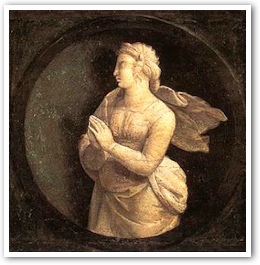Why Did God Become Man?
- FR. KENNETH BAKER, S.J.
One of the most common titles given to Jesus is that he is the Savior. In fact, the notion of Savior is included in the very name of Jesus (see Mt 1:21).
 |
The Nicene Creed does not use the exact word "Savior" in speaking of Jesus, but it does state the reason why the Word of God became incarnate in Jesus of Nazareth: "For us men and for our salvation he came down from heaven."
So the purpose of the Incarnation was to effect the salvation of all mankind. St. Paul says in 1 Timothy (1:15) that "Christ Jesus came into this world to save sinners." In the Gospel of John we read: "For God so loved the world that he gave his only Son, that whoever believes in him shall not perish but have eternal life. For God sent the Son into the world that the world might be saved through him" (3:16-17). In the biblical use, "salvation" is related to redemption and liberation. In the book of Exodus, we read how God called his people out of Egypt, how he saved them from slavery under the Pharoah. When the Bible and the Creed speak of "salvation" they are talking about the liberation of mankind from the power of sin, death and the devil. We know from revelation, especially from Genesis and the infallible teaching of the Church, that in the beginning God created man in a state of innocence and friendship with himself. As a result of man's rejection of God's love, he lost his original innocence, came under the power of sin and the devil, and was subject to death. Having lost God's grace, which was a pure gift to begin with and thus something to which he had no just claim, man became an outcast, unable to achieve the noble destiny to which God had ordained him.
Since man could not save himself from sin, could not by his own efforts regain the grace of God, God in his own infinite wisdom resolved to become man. Thus Jesus, the God-man, was able to make satisfaction to God's justice, for all his actions had infinite worth. Very succinctly, therefore, the Creed proclaims that the reason for the Word becoming flesh was to accomplish the salvation of men. And when the Creed says "men" it means "all men" without any distinction as to race, color or creed. God's salvation is not restricted to the chosen people. In the writings of St. Paul we learn that faith in Christ was first offered to the Jews and then to the gentiles. Some Jews accepted it and some rejected it, just as some gentiles believed and some did not.
When the Church says that "he came down from heaven", she is referring to the pre-existence of the divine Word that became man in Jesus of Nazareth. Thus the Person who is Jesus existed from all eternity in the unity of the Father, Son and Holy Spirit. The meaning is that he did not commence his existence with his conception in the womb of the Virgin Mary. He began to be in his human nature only.
In the faith-affirmation we are considering, there is also the idea of sacrifice and offering. This is said in a particular way by the preposition "for". Please note that in the consecration at Mass the Church directs the priest to say: "This is my body which will given up for you," and "It [my blood] will be shed for you and for all men so that sins may be forgiven." Thus our friendship with God and our possibility of attaining eternal happiness in the presence of God were attained for us by another. His name is Jesus Christ.
See the index of chapters from Fundamentals of Catholicism which have been reprinted to CERC here.
 This is Meaghen Gonzalez, Editor of CERC. I hope you appreciated this piece. We curate these articles especially for believers like you.
This is Meaghen Gonzalez, Editor of CERC. I hope you appreciated this piece. We curate these articles especially for believers like you.
Please show your appreciation by making a $3 donation. CERC is entirely reader supported.

Acknowledgement
Kenneth Baker, S.J. "Why Did God Become Man?" In Fundamentals of Catholicism Vol. 1 Chapter 16 (San Francisco: Ignatius Press, 1995), 55-56.
This article reprinted with permission from Father Kenneth Baker, S.J.
The Author

 Father Kenneth Baker, S.J., assumed editorship of Homiletic & Pastoral Review in April 1971 and remained in this position for almost forty years. In 1983 he published a three-volume explanation of the faith called Fundamentals of Catholicism Vol. 1, Creed and Commandments; Vol. 2, God, Trinity, Creation, Christ, Mary; and Vol. 3, Grace, the Church, the Sacraments, Eschatology
Father Kenneth Baker, S.J., assumed editorship of Homiletic & Pastoral Review in April 1971 and remained in this position for almost forty years. In 1983 he published a three-volume explanation of the faith called Fundamentals of Catholicism Vol. 1, Creed and Commandments; Vol. 2, God, Trinity, Creation, Christ, Mary; and Vol. 3, Grace, the Church, the Sacraments, Eschatology




